02/06/19
K-State Current - February 6, 2019
K-State Current is a weekly news update for the Kansas Board of Regents to apprise the Regents on a few of the many successes and achievements made by K-State faculty, staff and students.

K-State News
University awarded $521,800 to build community capacity and collaboration for juvenile justice initiatives
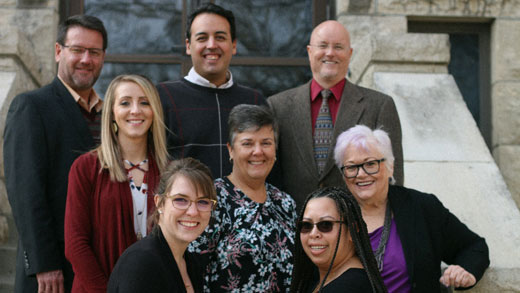 The K-State Juvenile Justice Collaborative, or K-State JJC, has been awarded $521,805 by the Kansas Department of Corrections and the Kansas Advisory Group to work with local communities in developing support systems for youth and families.
The K-State Juvenile Justice Collaborative, or K-State JJC, has been awarded $521,805 by the Kansas Department of Corrections and the Kansas Advisory Group to work with local communities in developing support systems for youth and families.
The goal of the project, titled "Our Town, Our Kids," is to prevent youth from entering the juvenile justice system and to provide services that maximize their chances of leading productive, successful lives.
K-State JJC is comprised of L. Susan Williams, professor of sociology and criminology; Greg Paul, associate professor and interim department head of communication studies; Elaine Johannes, associate professor of family studies and human services and Extension specialist; and Bruce Chladny, K-State Research and Extension specialist.
The project incorporates K-State Research and Extension, which has Extension professionals in each of the 105 Kansas counties, utilizing these connections to facilitate local collaboration and initiatives.
Over the next two years, K-State JJC will work with stakeholders in 23 pre-selected Kansas counties: Cheyenne, Decatur, Ellis, Finney, Gove, Graham, Greeley, Hamilton, Kearny, Logan, Norton, Osborne, Phillips, Rawlins, Rooks, Scott, Sheridan, Sherman, Smith, Thomas, Trego, Wallace and Wichita.
The project aims to build community capacity in data collection and analysis and to foster community collaboration in support of youth and families.
Professionals from K-State Research and Extension will facilitate local conversations that identify areas of concern and develop knowledge bases that will prepare communities to deliver best-practice programs in their respective areas. As part of the effort to engage positive community support, K-State JJC will develop a comprehensive toolkit for all Kansas communities that will facilitate local, sustainable systems that serve unique needs of youth.
K-State JJC includes top experts in juvenile justice, human development/adolescence, disproportionate minority contact, gender, trauma-informed care, data management and analysis, rural sociology, communication, restorative justice, and community facilitation and engagement.
The award reflects commitments of Kansas State University, the College of Arts and Sciences, the College of Human Ecology, and K-State Research and Extension to engagement, multidisciplinary collaboration, and improvement of the quality of life of all Kansans. The team also has contracted with Fort Hays State University's Docking Institute director Michael Walker and April Terry for data management and expertise.
New exhibition at Beach Museum of Art features work of White House photographer, university alumnus Pete Souza
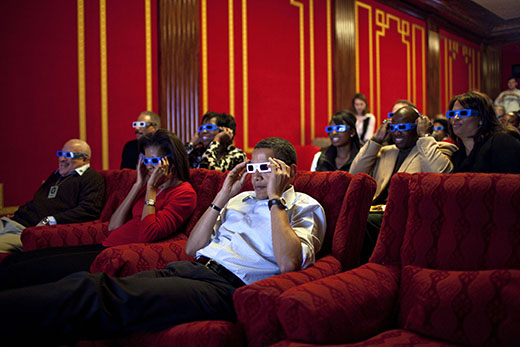 In this Feb. 1, 2009, photo, President and Michelle Obama and their guests don 3D glasses while watching a Super Bowl commercial in the family theatre at the White House. Photo by Pete Souza.
In this Feb. 1, 2009, photo, President and Michelle Obama and their guests don 3D glasses while watching a Super Bowl commercial in the family theatre at the White House. Photo by Pete Souza.
"Pete Souza: Two Presidents, One Photographer" will be on display Feb. 5-April 27 in the museum's Helm Gallery. The exhibition showcases 56 Souza photographs of two presidents at the opposite end of the political spectrum: Ronald Reagan and Barack Obama. Souza originally pursued his master's degree in journalism at Kansas State University in the 1970s and completed the degree in 2006.
"This exhibition includes Pete Souza's favorite images of Presidents Reagan and Obama, providing us with candid moments that are windows into their humanity," said Hava Gurevich with art2art Circulating Exhibitions, the exhibition organizer, of Ann Arbor, Michigan. "What we see in Souza's photographs are two presidents who clearly respected the office they held and genuinely respected the people they interacted with, no matter the circumstances."
"Pete Souza indicated to us that he wanted the exhibition to travel around the country in advance of the 2020 presidential election," said Liz Seaton, Beach Museum of Art curator. "He hopes to encourage civic conversation about the role of the presidency."
Currently a freelance photographer in Washington, D.C., Souza is the author of the book "Obama: An Intimate Portrait," which debuted at No. 1 on the New York Times bestseller list. He also is a professor emeritus of visual communication at Ohio University. Earlier in his career, Souza worked for the Chanute Tribune and Hutchinson News in Kansas and the Chicago Tribune.
In conjunction with the exhibition, Souza will give an on-campus talk about his work at 7:30 p.m. Tuesday, March 5, in McCain Auditorium. Tickets are free and required to attend. Tickets can be obtained at the McCain box office beginning Feb. 19, or reserved by calling 785-532-6428 and picked up at will call the night of the performance. Box office hours are noon to 4 p.m. Tuesday through Friday and 90 minutes before the Souza talk.
Souza's Kansas State University visit and talk are being made possible by the Friends of the Beach Museum of Art board and its Souza Fundraising Committee, which received support from community members, local businesses and campus entities. A list of all sponsors for the exhibition and talk is available at beach.k-state.edu. Committee members include co-chairs Anne de Noble and Barbara Gatewood, with Michaeline Chance-Reay, Carole Chelz, Anthony Crawford, Michael Donnelly, Gloria Freeland, Rebecca Hackemann-Bahlmann, Jay Nelson and Susan Noblett.
The Beach Museum of Art, at 14th Street and Anderson Avenue, is open Tuesday, Wednesday and Friday from 10 a.m. to 5 p.m.; Thursday from 10 a.m. to 8 p.m.; and Saturday from 11 a.m. to 4 p.m. Admission is free and free parking is available adjacent to the museum.
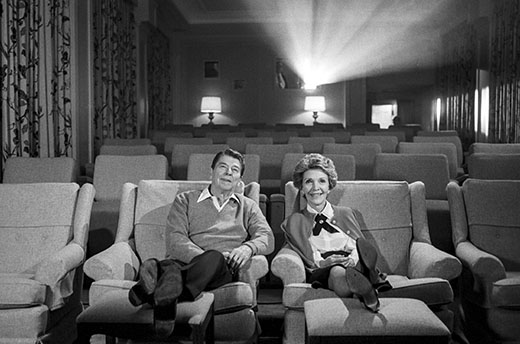 President and Nancy Reagan watch a movie during a taping of a television special with Barbara Walters in the White House in this photo from Feb. 26, 1986. Photo by Pete Souza.
President and Nancy Reagan watch a movie during a taping of a television special with Barbara Walters in the White House in this photo from Feb. 26, 1986. Photo by Pete Souza.
K-State Faculty Highlights
Grant Chapman, associate provost for the Office of International Programs, presented at the 2019 Association of International Education Administrators Conference, "What's Next? Possibilities and Probabilities in the Future of International Higher Education." The annual conference is the only conference specifically for those leading international education at higher education institutions. Higher education leaders from across the globe attended more than 100 sessions.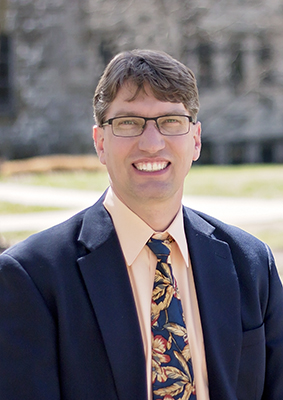
Chapman was one of four panel presenters for "Data issues help and hinder U.S. colleges seeking global profile: Some U.S. colleges find the ability to harness data plays key role in success or failure of international outreach." The panel also included Jane Meza at the University of Nebraska, Omaha and Lincoln campuses: Randy Kluver from Oklahoma State University and Sukant Misra of Texas Tech.
The panel discussed how many U.S. universities appear to be hurting themselves in the competition for international students by routinely failing to properly count data showing how well they are already doing. The miscounting and undercounting by U.S. colleges in areas such as the national origins of faculty seems to be part of an overall lack of appreciation for cross-border diversity, experts told the annual assembly of the Association of International Education Administrators.
Chapman described K-State's 15-year quest to become recognized as a Top 50 public research university by 2025. K-State has recognized that it cannot accomplish this without boosting its international profile.
"The university has set numerical targets for increasing the number of institutional partnerships it has with foreign campuses, and increasing the percentage of undergraduates who gain some kind of international experience," Chapman said.
Chapman said the panel discussion was picked up by the Times Higher Education — The United Kingdom edition — and that the discussion was standing room only.
Chapman was also just elected vice president to Mid America Universities International, or MAUI. The universities in MAUI work together to actively promote overseas educational opportunities for students and international teaching, consultation and research opportunities for faculty. The participating European partners are members of the Utrecht Network, a group of universities cooperating in the area of internationalization.
"This is the successor group to the Big 12 international programs officer group and includes more than Big 12 schools such as Nebraska, Colorado State, Missouri, Wichita State, Tulsa, etc," Chapman said. "It is a two-year appointment. I am excited by this appointment as this allows Kansas State a higher degree of visibility as well as engaging dialogue with our peer institutions."
Chapman was one of a few international education experts asked to lead a preconference workshop "Managing International Partnerships Training Course" as part of the upcoming Institute of International Education, or IIE, Summit 2019 in New York City, Feb. 16-19. The summit is expected to host more than 500 leaders, influencers and practitioners from education, government, business, philanthropy and media for action-oriented discussion and envisioning the next 50 years of international education.
The concept sounds simple, but understanding the process has been elusive: Cut off the nutrient supply to suppress the growth of tumors.
Now researchers in the College of Veterinary Medicine at Kansas State University are unveiling promising results for this concept by studying the behaviors of specific proteins in fruit flies. The proteins have known counterparts in humans.
"In our latest study, we identified 'Headcase,' or Hdc, and 'Unkempt,' or Unk, as two nutrient-restriction-specific tumor suppressor proteins that form a complex that acts to restrict cell-cycle progression and tissue growth in response to nutrient stress in Drosophilaorfruit flies," said Jianzhong Yu, assistant professor and cancer biologist in the college's anatomy and physiology department.
Yu is collaborating with Naren Li, postdoctoral fellow in anatomy and physiology; Yulan Xiong, assistant professor of anatomy and physiology; and QinfangLiu, doctoral student in physiology. The four of them recently published an article on their latest research, "Headcase and Unkempt Regulate Tissue Growth and Cell Cycle Progression in Response to Nutrient Restriction," in the journal Cell Reports.
Their study was supported in part by a grant from the National Institutes of Health's Kansas INBRE program, a startup fund and SUCCESS-FYI Intramural Grant from the College of Veterinary Medicine. The work is also supported by the Johnson Cancer Research Center at Kansas State University.
"Given the role of the human counterparts of these proteins, our results suggest that Hdc and Unk may function as tumor suppressors in mammals," Yu said. "Although the human ortholog of Unk has not been studied in the context of cell proliferation, we showed that both Hdc and Unk are able to inhibit tissue growth in vivo in the Drosophila model. Thus, it is worthwhile in the future to investigate the growth control function of these two proteins, especially in regard to the formation of cancer tumors."
K-State Student News
Kansas State University to host 2019 Mandela Washington Fellowship for Young African Leaders
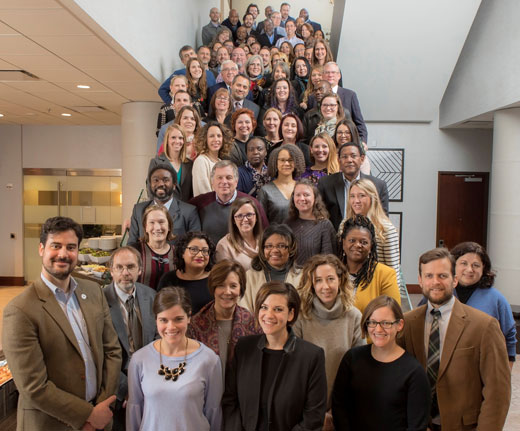
Kansas State University has been selected as an institute partner for the 2019 Mandela Washington Fellowship for Young African Leaders. Beginning in mid-June, K-State will host 25 of Africa's bright, emerging civic engagement leaders for a six-week Leadership Institute, sponsored by the U.S. Department of State.
The Mandela Washington Fellowship, the flagship program of the Young African Leaders Initiative, or YALI, empowers young African leaders through academic coursework, leadership training, mentoring, networking, professional opportunities and local community engagement. Since 2014, the U.S. Department of State has supported nearly 3,700 young leaders from 49 countries across sub-Saharan Africa to develop their leadership skills and foster connections and collaborations with U.S. professionals.
The cohort of fellows hosted by K-State will be part of a group of 700 Mandela Washington Fellows participating at 27 educational institutions across the United States. This summer, all fellows will receive a letter from President Trump welcoming them to the United States for their program. At the conclusion of their leadership institutes, these exceptional young leaders will convene in Washington, D.C., for the sixth annual Mandela Washington Fellowship Summit, where they will take part in networking and panel discussions with each other and with U.S. leaders from the public, private and nonprofit sectors. Following the summit, 70 competitively-selected fellows will participate in four weeks of professional development at U.S. nongovernmental organizations, private companies and government agencies.
Funded by the U.S. Department of State's Bureau of Educational and Cultural Affairs and working closely with its implementing partner, IREX, host institutions will offer leadership programs that will challenge, motivate and empower these inspiring young leaders from Africa.
Some highlights of the Kansas State University program:
- Fellows connecting with local partners through site visits to the Kansas Leadership Center, the Kansas State Capitol, and the Brown vs. Board of Education site and museum.
- Fellows serving the state through work alongside the Special Olympics, the city of Manhattan, HandsOn Kansas State and in Kansas City with Hope Faith Ministries, and Harvesters-The Community Food Network.
- You can meet the fellows at networking events that will be announced this spring and by contacting the Staley School of Leadership Studies.
For additional information about the Mandela Washington Fellowship Institute at Kansas State University, please contact Trisha Gott at tcgott@k-state.edu.
The Mandela Washington Fellowship for Young African Leaders is sponsored by the U.S. Department of State with funding provided by the U.S. Government and administered by IREX. For more information about the Mandela Washington Fellowship, visit yali.state.gov/mwf and join the conversation at #YALI2019.
